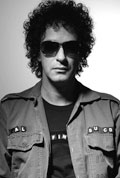
As if being the frontman for one of the most influential Spanish rock bands of all times wasn’t enough, Argentinian Gustavo Cerati managed to also produce and write many of the band’s greatest hits.
As part of Soda Stereo, the hottest Spanish rock band of the late 80’s and early 90’s, Cerati and the band easily filled venues in both Los Angeles and South America. After many years of performing as Soda Stereo, the band decided to bid farewell to the stage and each followed independent projects.
While in Soda Stereo, Cerati and the band released numerous albums such as Nada Personal in 1985, Ruido Blanco in 1987, Doble Vida in 1988, an EP Languis in 1989, Canción Animal in 1990, and Dynamo in 1993. Their last album together as a band was in 1995 under the name Sueño Estereo.
On May 1, 1997, the band performed its last performance at El Estadio de River Plate in Buenos Aires. Over 70,000 people witnessed this memorable rock moment in history as Soda Stereo bid farewell to the fans that had followed them throughout the years.
Cerati’s first album as a solo artist was titled Amor Amarillo and released in 1994 while Soda Stereo was on the brink of breaking up. His decision to pursue a solo career received mixed commentary from his fans, since the decision for Soda Stereo to break up appeared to be mostly his. Aware of his fan’s reluctance to accept him as solo artist, Cerati continued to compose hit songs and rewarded his fans with.
His official solo debut album Bocanada was released in 1999 and was a fusion of electronica, guitar, and orchestral arrangements. He then released a trio of albums in 2002 in which he ventured into different musical styles. With Bocanada, Cerati fans seemed to pull away from him as a solo artist and refused to forgive the culprit of their favorite band’s break up.
Aware that his fans were not buying his electronica and orchestra music, Cerati released Ahí Vamos in 2006, which was more along the lines of Soda Stereo material.
Cerati’s musical influences include Led Zepellin, Pink Floyd, David Bowie, and The Beatles. Cerati was also powerfully influenced by the Police and Elvis Costello. So influential was the Police to Cerati, that he initiated a Spanish-language tribute album to the band titled Outlandos d’Americas which was released in 1998.
As a solo artist, Cerati went on to release +Bien in 2002, 11 Episodios Sinfónicos in 2002, Siempre es hoy in 2002, Reversiones/Siempre es hoy in 2003, and Canciones Elegidas 93-04 in 2004. He then released the album Ahí Vamos in 2006. The album went platinum in Argentina solely on pre-ordered sales, and won two Grammy awards for Best Rock Vocal Album and Best Rock Song for “Crimen”.
With numerous hit albums under his belt as part of Soda Stereo and as a solo artist, Gustavo Cerati managed to remain timeless in the most turbulent times of rock music. The love-hate relationship with his fans has proven that even the longest-held grudge can be forgiven.
*Gustavo Cerati is recipient of two Grammy awards for Best Rock Vocal Album and Best Rock song for “Crimen”.
*Gustavo Cerati es otorgado con dos premios Grammy en las categorías Best Rock Vocal Album y Best Rock Song para la canción “Crimen”.

